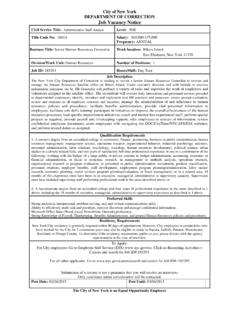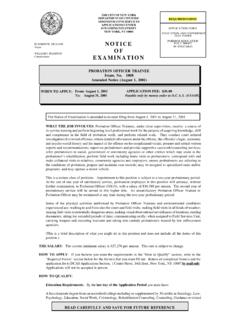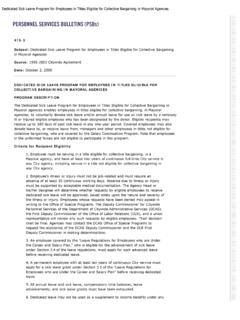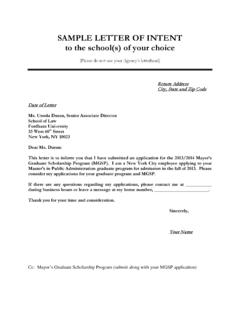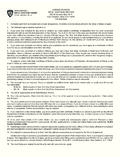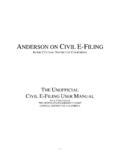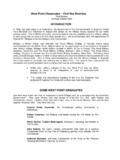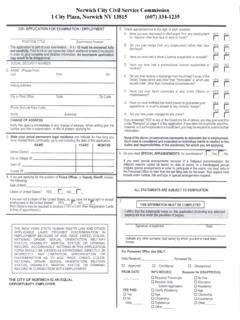Transcription of An Abbreviated History of Government Ethics …
1 NYSBA Municipal Lawyer | Fall 2013 | Vol. 27 | No. 3 49 After a detailed study of the Ethics provisions of the Charter in 1957 and 1958, the state legislature and the Council in 1959 enacted major changes to the City s Ethics laws, including most of the substantive provi-sions of the City s current confl icts of interest law in Charter Chapter 68, and established the Board of Ethics to render advice to public servants on the provisions of the Ethics That Board of Ethics consisted of the Corporation Counsel, the Director of Personnel, and three public members appointed by the mayor who were to serve without In the Charter amendments of 1975, these provisions were expanded and shifted to a new Chapter 68 of the Finally, in 1988 and 1989.
2 Chapter 68 was amended to create the fi ve-member Confl icts of Interest Board as an inde-pendent body and to add to that body s responsibilities confl icts of interest training, administration of annual disclosure, and from municipal Government to the federal Government , we see that the real watershed in Ethics laws in the United States occurred at the federal level during the Civil War Civil WarThe Civil War caused a major procurement ef-fort by the federal Government and a correspond-ing amount of corruption by various providers. The word shoddy came into use during the Civil War to describe the many inferior and defective goods pur-chased by the federal Government for use by Union soldiers. The term applied to everything from rifl es and tents to shoes, blankets and against such fraud led to the passage of the False Claims Act on March 2, The False Claims Act, also known at the time as the Lincoln This is the second part of an article providing an Abbreviated History of Government Ethics laws.
3 In the fi rst part, which ran in the previous issue of the Municipal Lawyer, we spanned the centuries and the globe, starting with the code of Hammurabi, promulgated by the King of Babylon in the 18th century , and con-cluding with the Empire Public Offi cials Law of 1873 in Bismarck s Germany. In this part, we focus our attention on New York City and the United States, starting with municipal Ethics laws and then turning to the relevant federal laws. And, as a reminder of the relative youth of the United States, our survey covers less than two centuries, as we start with a law imposing restrictions on New York City s Board of Alderman in reiterate a major caveat to this article: none of the authors is a historian, let alone a legal historian or philosopher or theologian.
4 We therefore welcome any corrections or additions to the examples cited in this article, corrections and additions that they will seek to post on the Section s website. NYC s Board of Alderman Restrictions of 1830 Starting with New York City in 1830, one notes the enactment of a law prohibiting members of the New York City Board of Aldermen and Board of Assistants from having any direct or indirect interest in any con-tract, the expense or consideration of which was to be paid under an ordinance of the Common The Board of Aldermen, together with the Board of Coun-cilmen, formed the Common Council, the forerunner of the City provision was expanded over the years. By 1901, it included a prohibition on buying one s City offi ce, in language virtually identical to today s Charter 2604(b)(10) and 2606(c).
5 4 The 1938 revi-sion to the Charter expanded the provision further to prohibit certain appearances before City agencies or against the interests of the City, the forerunner of cur-rent Charter 2604(b)(6)-(8), as well as the acceptance of gratuities, the forerunner of Charter 2604(b)(13).5An Abbreviated History of Government Ethics Laws Part II1By Mark Davies, Steven G. Leventhal and Thomas J. MullaneyMark DaviesThomas J. MullaneySteven G. Leventhal50 NYSBA Municipal Lawyer | Fall 2013 | Vol. 27 | No. 3 Act also prohibited retaliatory discharge or demotion of Government employees for political reasons, and prohibited solicitation of campaign contributions on federal Government Pendleton Act also created the United States Civil Service Commission.
6 Initially, the Act applied to about ten percent of the federal civilian workforce. However, by 1896, a provision allowing outgoing presi-dents to protect their patronage appointees by con-verting their jobs to civil service positions led to most federal employees holding civil service titles. One such outgoing president was Arthur, who lost the support of his party due to his support of civil service an 1887 essay entitled The Study of Adminis-tration, 19 Woodrow Wilson said that: ..we must regard civil-service reform in its present stages as but a prelude to a fuller administrative reform. We are now rectifying methods of ap-pointment; we must go on to adjust executive functions more fi tly and to prescribe better methods of executive organization and action.
7 Civil-service reform is thus but a moral prepara-tion for what is to follow. It is clearing the moral atmosphere of offi cial life by establishing the sanctity of public offi ce as a public trust, and, by mak-ing service unpartisan, it is opening the way for making it businesslike. By sweetening its motives it is rendering it capable of improving its method of work. In 1889, President Benjamin Harrison appointed Theodore Roosevelt as United States Civil Service Commissioner, based on Roosevelt s support of the New York State Civil Service Act of 1883, as well as his enthusiasm and effectiveness in challenging political corruption in New York. After only one week in offi ce, Commissioner Roosevelt recommended the removal of examination board members in New York for selling test questions to the public for $50.
8 Later, he had sup-porters of President Harrison arrested for buying votes in assassination in 1901 of another president, William McKinley, resulted in the elevation of then Vice-President Theodore Roosevelt to President of the United States. As President, Roosevelt signifi cantly expanded the federal Government and introduced reforms that evolved into the modern merit system. Roosevelt-era reforms included the adoption of a defi -nition of just cause for dismissal, stricter enforcement of restrictions against political activities by federal offi cials, prohibitions against the payment of illegally Law, 12 made it a criminal offense to submit any false or fraudulent bill or claim for the purpose of obtaining payment from the United States.
9 Punishment was by fi ne or imprisonment as a court martial may adjudge, excepting only the death penalty. The law also con-tained a qui tam provision,13 which allowed any person to bring a suit in his own name, as well as that of the United States, to recover the amount of a false claim against the Government . If the suit was success-ful, the plaintiff would receive half of the forfeiture and the other half would be paid to the United other statutes enacted during or about the time of the Civil War also addressed the avoidance of fraud and confl icts of interest. On February 26, 1853, Congress enacted An Act to Prevent Frauds upon the Treasury of the United States, which forbade any of-fi cers of the , and any members of Congress, from accepting any payment, or any share in a claim against the , in exchange for aiding the prosecution such The same statute also made it a crime to offer anything of value to a member of the Senate or House of Representatives with intent to infl uence his vote or decision on any question and also criminalized the acceptance of such a payment.
10 The penalties included fi ne and imprisonment, as well as forfeiture of one s public offi ce and permanent disqualifi cation from holding public offi ce in the United States. In response to further ethical abuses during the Civil War, the statute was extended and applied to a wider range of matters and July 16, 1862, Congress enacted another statute that forbade any member of Congress from accepting anything of value in exchange for his aid to anyone in procuring any contract, offi ce or place from the Government . It provided for punishment by fi ne and imprisonment, and also provided that a contract so obtained may be declared null and void at the discre-tion of the President. Furthermore, that member of Congress or offi cer would be disqualifi ed from hold-ing any offi ce under the the Civil War to Watergate: The Reform Era The Civil War era corruption in procurement and abuses of the spoils system led to a reform move-ment that continued through the middle of the 20th Century.
